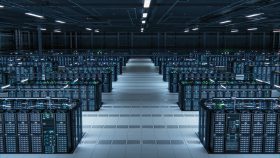Stargate Has Been Announced. Here Are Our Questions ...

On Tuesday, January 21, U.S. President Donald Trump announced the Stargate Project, a new joint venture dedicated to building up to $500 billion in AI infrastructure in the U.S. The massive undertaking will be funded initially by SoftBank, OpenAI, Oracle, and UAE investment firm MGX. The project will employ over 100,000 Americans, Trump said.
“Beginning immediately, Stargate will begin building the physical and virtual infrastructure to power the next generation of advancements in AI,” the president said.
Construction of Stargate datacenters has already begun in Texas, according to a post on OpenAI. And Trump said that power sources could be provided by the datacenter builders, hinting that nuclear power could be deployed as a solution to the enormous power requirements of AI datacenters.
Many Questions
The questions began almost immediately, starting with who’s running Stargate. According to OpenAI’s post:
“SoftBank and OpenAI are the lead partners for Stargate, with SoftBank having financial responsibility and OpenAI having operational responsibility. Masayoshi Son [the CEO of SoftBank] will be the chairman.”
Son himself in December 2024 pledged $100 billion to be invested U.S. projects over the next four years. It’s not clear whether this is the money Son will use to get Stargate off the ground, though in December Trump maintained that the investment would help create 100,000 jobs, the number he again mentioned in this week’s announcement. As head of Stargate with financial responsibility, it’s likely SoftBank is the source of the $100 billion OpenAI says is being initially deployed to start the project.
Musk Pops the Balloon
Another question is whether the project backers, chiefly SoftBank, can actually afford to bankroll Stargate. Elon Musk on Tuesday night weighed in on X:
“They don’t actually have the money…. SoftBank has well under $10B secured. I have that on good authority.”
According to the Wall Street Journal, SoftBank has “roughly $30 billion of cash on hand. Still, the initial investment Son pledged last month was said to be rolling out over four years, indicating that while the investment looks enormous, it could roll out over a longer period than the announcement seems to indicate.
The WSJ also notes that the Tesla CEO may have an axe to grind in criticizing Stargate. Musk “despises” OpenAI CEO Sam Altman and OpenAI, with which he’s had legal entanglements dating back to his tenure as an OpenAI founder. And Musk’s xAI, which runs the Colossus datacenter in Memphis, could be in a position to compete with Stargate for resources, specifically AI chips from NVIDIA.
Microsoft CEO Satya Nadella, pressed by CNBC on the Musk claim that SoftBank and its partners don't have the money to back Stargate, said only, “Look, all I know is, I’m good for my $80 billion.” That figure came from a now-famous blog post by Microsoft vice chair and president Brad Smith, which encouraged the new administration to follow through on Trump’s 2019 AI Executive Order.
Where Is Jensen?
Which brings up another question: Where were the heads of Microsoft and NVIDIA in all this? While Altman, Oracle’s chairman Larry Ellison, and Son were all present with Trump for the announcement, there was no sign of Microsoft CEO Satya Nadella or NVIDIA’s ubiquitous CEO Jensen Huang, though both Microsoft and NVIDIA, along with Oracle and Arm, are said to be the initial technology partners in Stargate.
Indeed, Huang has been conspicuous for not having had his dinner at Mar-a-Lago, though he expressed interest in being invited. Huang has also expressed his interest in maintaining ties with the China market, despite U.S. chip trade restrictions. He also recently visited the PRC.
Huang's absence is notable. Though not a financial backer of Stargate, NVIDIA will play a key role in contributing infrastructure to the project.
The Stargate announcement also prompts questions about companies apparently left out of the loop, including AWS, AMD, Salesforce, IBM, and others. With AI generating fierce competition for resources, it’s possible that other vendors who haven’t gotten the nod will likely create their own projects.
What Exactly Will Stargate Do?
It's worth asking what Stargate will do exactly. Will it compete with the likes of CoreWeave and Lambda in offering AI infrastructure for hire? Will it train new LLMs? Will its resources be devoted to specific projects? The answer isn't clear.
Regardless of its go-to-market strategy, the Stargate Project will have a common system across all facilities. The statement from OpenAI continues:
“As part of Stargate, Oracle, NVIDIA, and OpenAI will closely collaborate to build and operate this computing system. This builds on a deep collaboration between OpenAI and NVIDIA going back to 2016 and a newer partnership between OpenAI and Oracle.”
Whether or not Stargate can succeed may be a matter of time and interest. It will no doubt take longer than a year to get the project off the ground, and that will require all parties to maintain a solid interest in the project. Whether other interests, financial or market realities distract participants could be decisive.
Futuriom Take: The Stargate Project so far seems like a marketing event because it raises many questions, most notably about its viable funding. Whether or not it succeeds, it will likely take longer and require more effort than the participants are indicating right now.

















